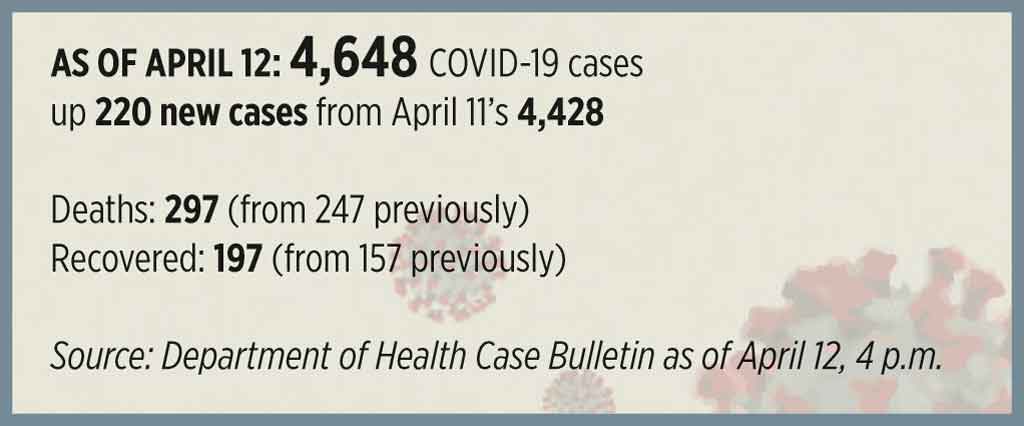Government still debating size of economic recovery package
THE government’s economic team has identified funding for P1.171 trillion worth of social amelioration measures and tax and fiscal action to mitigate the impact of coronavirus disease 2019 (COVID-19), with a decision yet to be reached on how much will go towards supporting economic recovery.
According to a document sent by Finance Secretary Carlos G. Dominguez III to reporters late last week, the COVID-19 response package consists of four pillars, for which funding levels for only three have been pencilled in. These consist of P830.47 billion worth of fiscal and monetary action, P305.218 billion for emergency support to vulnerable sectors and P35.722 billion to fund medical expenses.
The last pillar is the economic recovery plan, the funding level for which has yet to be determined.
The P1.171 trillion package is equivalent to 6.3% of gross domestic product (GDP). The accepted international rule of thumb for prudent deficit spending is around 3% of GDP, which the government has sought to exceed in recent years to drive its flagship infrastructure program.
The P830.47 billion worth of fiscal and monetary action includes additional financing from multilateral and bilateral lenders worth P310 billion. Some P470 million comes in the form of administrative relief through tax deadline extensions as well as the exemptions from documentary stamp tax for credit extensions or loan restructurings.
On the monetary side, the Bangko Sentral ng Pilipinas (BSP) accounted for P520 billion after buying P300 billion worth of government securities at zero interest and injecting liquidity to the financial markets totaling P220 billion via the reduction of policy rates and bank reserve requirements.
Support for the vulnerable will include P205 billion for emergency cash aid to 18 million low-income families, a P35 billion wage subsidy for employees of small businesses that closed during the lockdown, P30 billion worth of additional assistance to local government units (LGUs), P16.5 billion worth of rice programs to boost reserves and a P10-billion lending package for the Land Bank of the Philippines (LANDBANK) intended for LGUs.
Other programs include P3 billion worth of online programs offered by Technical Education and Skills Development Authority (TESDA), P2.8 billion in zero-interest loans by the Agriculture department for farmers and fisherfolk, P2 billion worth of cash assistance by the Department of Labor and Employment (DoLE) for displaced workers and P1.5 billion to support Overseas Filipino Workers.
Some P1.2 billion will fund unemployment benefits provided by the Social Security System (SSS), and P1.203 billion will support loan programs for micro, small and medium enterprises (MSMEs) with P15 million worth of loan programs for micro and small businesses involved in agriculture and fisheries.
Funding for medical expenses outbreak include P22.185 billion worth of coverage by PhilHealth for COVID-19 patients and assistance to health workers, including compensation for severe infections and a death benefit; P5 billion from the World Bank in the form of a fast-track loan facility to buy medical supplies and test kits; P2.9 billion worth of medical equipment and supplies funded by Philippine Amusement and Gaming Corporation (PAGCOR) and Philippine Charity Sweepstakes Office (PCSO); P2.701 billion worth of tax and duty exemptions for the import of personal protective equipment (PPE) and other medical goods; P1.8 billion to the Department of Health (DoH) to acquire 1 million sets of PPE.
Also authorized was P511.8 million worth of compensation to private facilities used in the COVID-19 response; P420.6 million from PCSO for Philippine Health Insurance Corporation’s (PhilHealth) medical coverage remitted to COVID-19 patients; and P53.2 million allocated for the production of test kits developed by the University of the Philippines-National Institutes of Health, with funding from the Department of Science and Technology (DoST).
The government can also tap a P150 million grant from the Asian Development Bank (ADB) to support health measures.The estimates were issued on April 9 and are subject to regular updating.
It said the “bounce back plan” for the post-quarantine period aims to create jobs and sustain economic growth via continued investment in social and infrastructure programs.
While some of the funds were sourced from the national budget, Mr. Dominguez said the government will tap multilateral lenders as well as commercial markets to plug the funding gap.
The government has sought a $100-million loan from the World Bank to fund the DoH’s efforts to contain COVID-19. The loan is expected to be acted on by the bank’s board on April 20.
With the additional spending on COVID-19 items, Mr. Dominguez said the budget deficit may rise to 5.3% of GDP this year, against the previous target of 3.2%, while the debt stock is expected to rise to 47% of GDP from the record-low 41.5% last year.
Mr. Dominguez has said the government may consider raising taxes “in a year or two” for additional revenue in order to support the higher debt load. However, there are still no immediate plans for such a move.
Michael Henry Ll. Yusingco, a senior research fellow at the Ateneo de Manila University Policy Center said legislators should conduct “meaningful and genuine consultation” to draft appropriate tax bills by engaging with businesses, civil society organizations, labor groups and fiscal experts.”
The proposal to increase taxes must be anchored on a clear and coherent relief and recovery plan. Meaning, any legislation for this purpose must palpably be about ensuring the healthy recovery of the country from this global pandemic,” Mr. Yusingco said in an e-mail. — Beatrice M. Laforga

